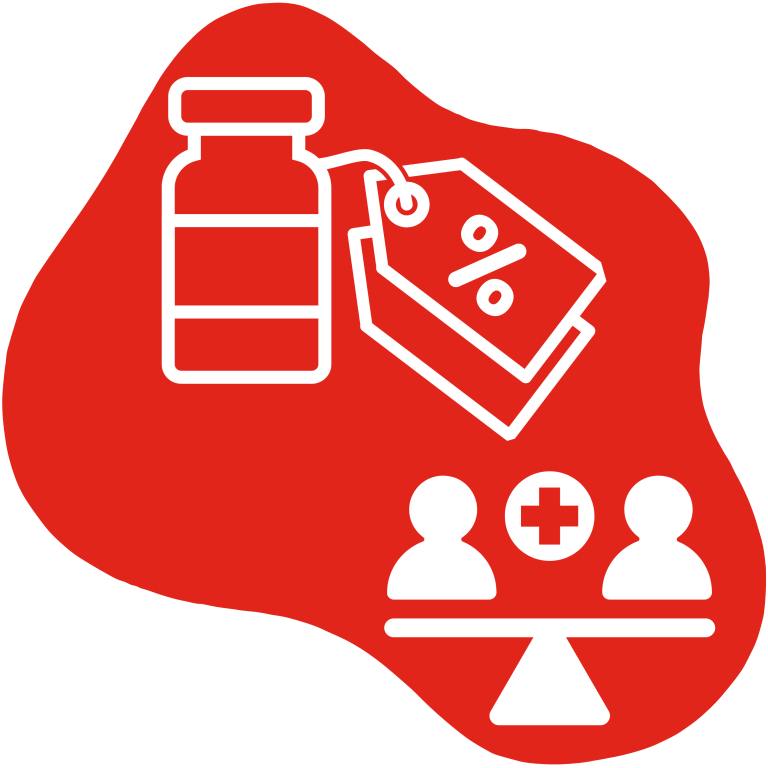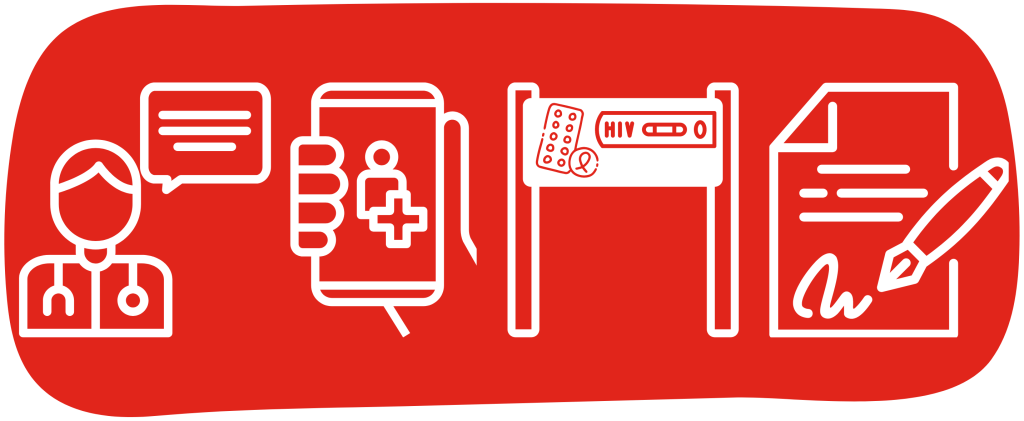As the world’s first and leading HIV and AIDS services organization, GMHC advocates for public policy reform at all levels of government to support our mission and the communities we serve. We have highlighted several bills that, when enacted, will help achieve our goal to end the epidemic.
Follow our legislative priorities at every stage of the lawmaking process below! Click on the bill titles to learn more.
COMMITTEE ACTION
AWAITING GOVERNOR’S SIGNATURE
COMMITTEE ACTION
FLOOR ACTION
NYS SENATE NYS ASSEMBLY
AWAITING GOVERNOR’S SIGNATURE
PrEP Prior Authorization Removal
Decriminalization of Persons Living with STIs
Medical Coverage for Undocumented Immigrants
Increased Testing Availability
Prohibition Against PrEP Copayments
Collecting Sex/Gender Demographics
Long-Term Residents’ Bill of Rights
Stop HIV Drug Restrictions & Delays
HIV Insurance Discrimination
Current Bill Status: in Committee Senate
Current Bill Status: in Committee Senate
Medical professionals should be required to complete training on sexual health, sexual orientation, gender identity, HIV and STIs every four years.
According to a nationwide study, nearly 50% of Lesbian, Gay, and Bisexual respondents and 90% of those who are Transgender and gender nonconforming living with HIV reported not believing that medical professionals were properly trained in their type of care.

A 2019 study of OB/GYN resident physicians found that participation in just one training course regarding HIV transmission and PrEP usage increased comfort levels in determining eligibility for and prescribing PrEP.
A 2013 study done on Boston University medical students found that their comfort working with transgender patients increased by 67% after information about gender identity was added to the curriculum.
A 2013 study done on Boston University medical students found that their comfort working with transgender patients increased by 67% after information about gender identity was added to the curriculum.
Current Bill Status: Passed Senate, in Assembly Insurance
Prior authorization should not be a requirement for the provision of pre-exposure prophylaxis (PrEP).



Despite demonstrated efficacy, many barriers to care prevent at-risk individuals from accessing and remaining on PrEP treatment. This can be particularly concerning for individuals who are trying to prevent infection following a high-risk exposure.
PrEP reduces the risk of getting HIV from sexual intercourse by 99% when taken daily. Among frequent drug users, PrEP reduces the risk of getting HIV by at least 74% when taken daily.
New diagnoses rose for transgender people, people between the ages of 50 and 59, men who have sex with men, and men who inject drugs. In addition, men of color continue to access PrEP at a significantly lower rate than those who are white.
Current Bill Status: in Assembly Insurance
Prior authorization should not be a requirement for the provision of pre-exposure prophylaxis (PrEP).

Despite demonstrated efficacy, many barriers to care prevent at-risk individuals from accessing and remaining on PrEP treatment. This can be particularly concerning for individuals who are trying to prevent infection following a high-risk exposure.

PrEP reduces the risk of getting HIV from sexual intercourse by 99% when taken daily. Among frequent drug users, PrEP reduces the risk of getting HIV by at least 74% when taken daily.

New diagnoses rose for transgender people, people between the ages of 50 and 59, men who have sex with men, and men who inject drugs. In addition, men of color continue to access PrEP at a significantly lower rate than those who are white.
Current Bill Status: in Higher Education Senate Committee
Current Bill Status: in Higher Education Senate Committee
Pharmacists should be authorized to dispense HIV pre-exposure and post-exposure prophylaxis.
Many people at high-risk of HIV are unlikely to have a regular doctor and may not know how to access this medication.

Increased access to preventative treatment will reduce the amount of New Yorkers newly diagnosed with HIV year after year.
Current Bill Status: Passed Assembly on 3/29/25; in Senate Health Committee
Terminally ill, mentally capable adults should have the ability to request, obtain, and decide to ingest medication to die peacefully in their sleep should their suffering be unbearable.



The opportunity to bring peace of mind to terminally ill patients by allowing them to decide for themselves how much suffering they must endure is supported by both physicians and public opinion.
Many older individuals living with HIV and AIDS may experience long-term comorbidities, which can lead to an immense amount of suffering as they approach the end of their lives.
This bill is modeled after the Oregon Death with Dignity Act, which has been in effect for more than 20 years without a single instance of abuse or coercion.
Current Bill Status: in Senate Health Committee
Terminally ill, mentally capable adults should have the ability to request, obtain, and decide to ingest medication to die peacefully in their sleep should their suffering be unbearable.

The opportunity to bring peace of mind to terminally ill patients by allowing them to decide for themselves how much suffering they must endure is supported by both physicians and public opinion.

Many older individuals living with HIV are likely to experience consequences from untreated infection or side effects from other comorbidities of the disease, which can lead to an immense amount of suffering as an individual approaches the end of their life.

This bill would be modeled after the Oregon Death with Dignity Act, which has been in effect for more than 20 years without a single instance of abuse or coercion.
Persons living with sexually transmitted infections who engage in sexual activity should not be criminalized.
Criminalizing individuals with STIs disincentivizes them from getting tested and treated.
This bill reassures New Yorker living with HIV and AIDS that consensual, sexual conduct cannot create criminal liability.

Fear and stigma about STIs promote stereotypes about the sexual practices of already-marginalized groups.
Basic health services should be readily available for undocumented immigrants currently ineligible for health insurance.

NY’s Essential Plan should include all with an income up to 250% of the federal poverty level, regardless of immigration status, which would enable an additional 245,000 people to be insured.
Coverage For All would also save the state more than $500 million a year, which is currently being spent on Emergency Medicaid for the undocumented.
Individuals under age 18 should be able to consent to the diagnosis of and treatment for STIs without guardianship consent.



Young men of color who have sex with men have a higher risk of contracting oral and rectal STIs compared to their their white peers.
Most youth are unlikely to discuss sexual behavior with guardians, which makes them less likely to be tested for STIs if parental/guardians if consent is required.
Nationally, one in four sexually active teens will have an STI by age 18, yet in 2019 only 9% of high school students had been tested for HIV and other STIs.
Individuals under age 18 should be able to consent to the diagnosis of and treatment for STIs without guardianship consent.

Young men of color who have sex with men have a higher risk of contracting oral and rectal STIs compared to their their white peers.

Most youth are unlikely to discuss sexual behavior with guardians, which makes them less likely to be tested for STIs if parental/guardians if consent is required.

Nationally, one in four sexually active teens will have an STI by age 18, yet in 2019 only 9% of high school students had been tested for HIV and other STIs.
Education law in regard to comprehensive sexuality in schools should be amended.



Psychological research shows that youth who do not have access to these programs are put at a disadvantage for negative health outcomes and increased high-risk sexual behaviors.
Comprehensive, age-appropriate sex education has been shown to decrease rates of STIs and homophobia-related bullying, as well as broaden understandings of gender and gender norms and increase knowledge and skills that support healthy relationships.
This type of access is especially important for youth who are a part of historically marginalized communities, such as LGBTQ+ individuals and people of color.
Education law in regard to comprehensive sexuality in schools should be amended.

Psychological research shows that youth who do not have access to these programs are put at a disadvantage for negative health outcomes and increased high-risk sexual behaviors.

Comprehensive, age-appropriate sex education has been shown to decrease rates of STIs and homophobia-related bullying, as well as broaden understandings of gender and gender norms and increase knowledge and skills that support healthy relationships.

This type of access is especially important for youth who are a part of historically marginalized communities, such as LGBTQ+ individuals and people of color.
Pharmaceutical manufactures should be prohibited from discriminating against 340B covered entities.
Section 340B of the Public Health Service Act requires that Medicaid providers discount drug prices for uninsured, underinsured, and low income communities. This is vital to ensuring that New Yorkers can access their medication at affordable prices, regardless of insurance status.
Pharmaceutical manufactures need to be prohibited from acting in bad faith by to limit 304B priced drug shipments to only certain pharmacies or issuing higher fees to 304B providers. Similar passed laws in Louisiana and Arkansas have effectively eliminated discriminatory policies and pricing.

Improve the timely diagnosis of HIV patients by expanding forms of notification for testing availability.
Despite the legal offering of HIV testing, the frequent, concurrent diagnosis of AIDS/HIV indicates many individuals are living untested and thus untreated.
Increasing the means in which professionals can relay information on voluntary HIV testing, as well the availability of pre and post-exposure prophylaxis medications (prEP and PEP), can incentivize individuals to receive checkups.

Insurers should be prohibited from coverage discrimination against individuals based on HIV status.
Recent advances in HIV prevention and treatment mean that insurers should not be able to deny patients life or disability income insurance coverage solely because a patient is HIV positive or has been prescribed PrEP to prevent HIV.

HIV is a chronic condition that can be managed with effective drug treatments. There is no reason that HIV positive individuals should be treated any differently than people with other chronic conditions such as diabetes.
Knowing one’s status and preventing HIV are key to stopping the spread of HIV. Discriminating against individuals who do this only encourages people to not know their status and poses a risk to public health.
Insurers and preferred drug and managed care programs should be prohibited from restricting or delaying the distribution of antiretroviral prescription drugs to New Yorkers living with HIV and AIDS.

A person living with HIV who is on effective treatment can live a long, healthy life and have effectively no risk of sexually transmitting HIV to others.
Restricting access to life-saving HIV medication both undermines the relationship between healthcare provider and patient and puts up unnecessary roadblocks to possible prevention and treatment.
Ensures insurers cannot require copayments for pre exposure prophylaxis (PrEP).
Despite its a ‘A’ rating, PrEP is not subject to annual deductibles and coinsurance

Services deemed “Grade A” are strongly recommended for patient use by the United States Preventive Services Task Force
However, the insurance law provided no explicit prohibition against the use of copayments for PrEP, until now!
Ensures insurers cannot require copayments for pre exposure prophylaxis (PrEP).
Despite its a ‘A’ rating, PrEP is not subject to annual deductibles and coinsurance

Services deemed “Grade A” are strongly recommended for patient use by the United States Preventive Services Task Force
However, the insurance law provided no explicit prohibition against the use of copayments for PrEP, until now!
Collecting demographic information on sexual orientation and gender identity/expression is a key tool to understanding the unique needs of Queer communities.
While Queer New Yorkers tend to have geographic and cultural similarities, more work needs to be done for the State to fully understand and address the unique needs of this vulnerable community.
Collecting this type of demographic data and making it publicly available will help both State agencies and non-profit organizations uplift the lives of the State’s Queer community.

Barring discrimination on the bases of real or perceived HIV status should be essential in supporting New York State’s aging population.
The findings of a 2011 nationwide study found that 78% of LGBT seniors feel that they can not be open with the staff of a long-term care facility about their sexual orientation or gender identity.

HIV-affected elders are more likely to rely on long-term care settings as they age, further demonstrating the importance of their ability to receive necessary care free of stigma.
The LGBT Long-Term Care Facility Residents’ Bill of Rights would help address common issues faced by many LGBT seniors, such as denying admission to a long-term care facility or discharging a resident based on their actual or perceived identity or HIV status.
Barring discrimination on the bases of real or perceived HIV status should be essential in supporting New York State’s aging population.
The findings of a 2011 nationwide study found that 78% of LGBT seniors feel that they can not be open with the staff of a long-term care facility about their sexual orientation or gender identity.

HIV-affected elders are more likely to rely on long-term care settings as they age, further demonstrating the importance of their ability to receive necessary care free of stigma.
The LGBT Long-Term Care Facility Residents’ Bill of Rights would help address common issues faced by many LGBT seniors, such as denying admission to a long-term care facility or discharging a resident based on their actual or perceived identity or HIV status.